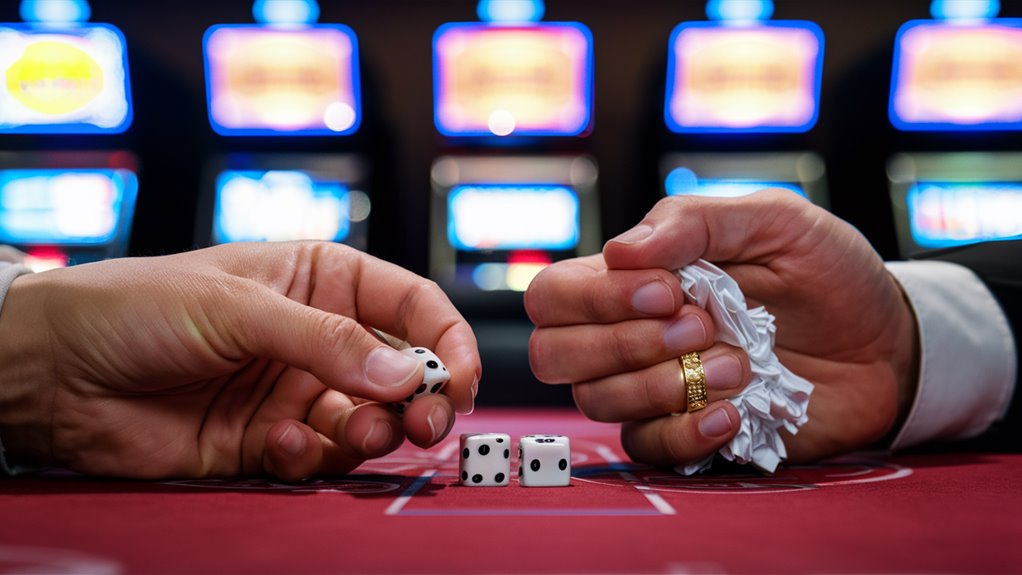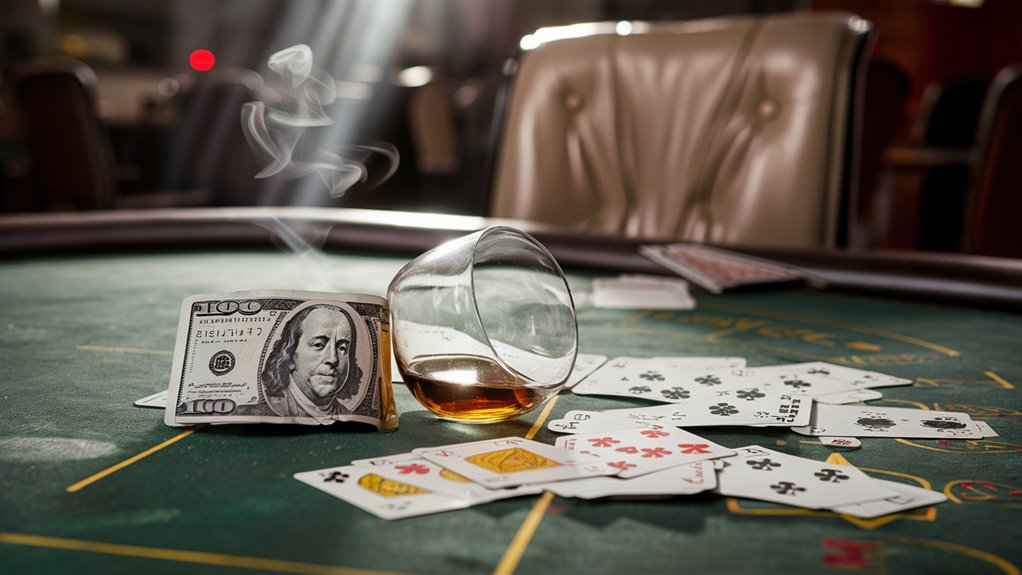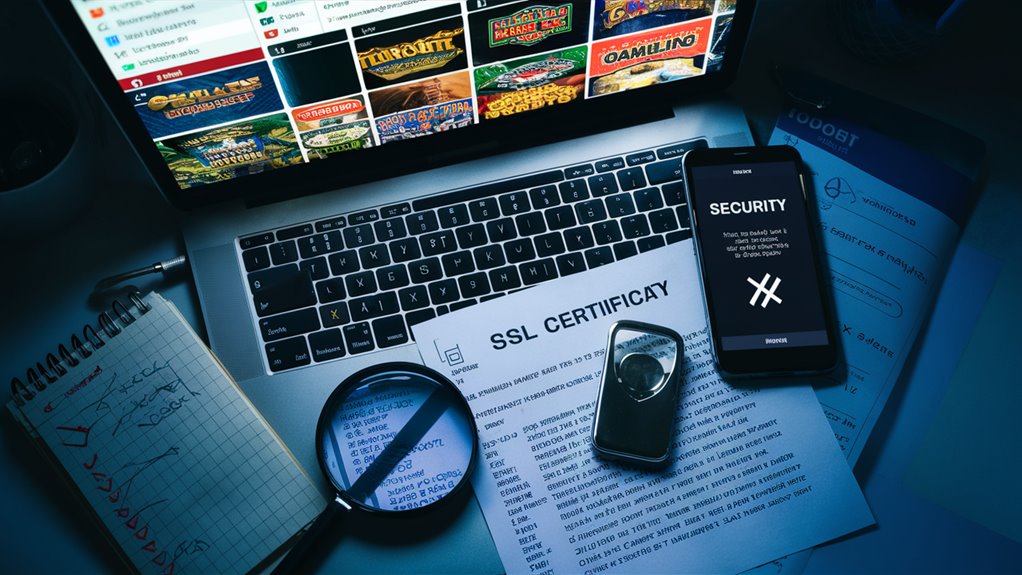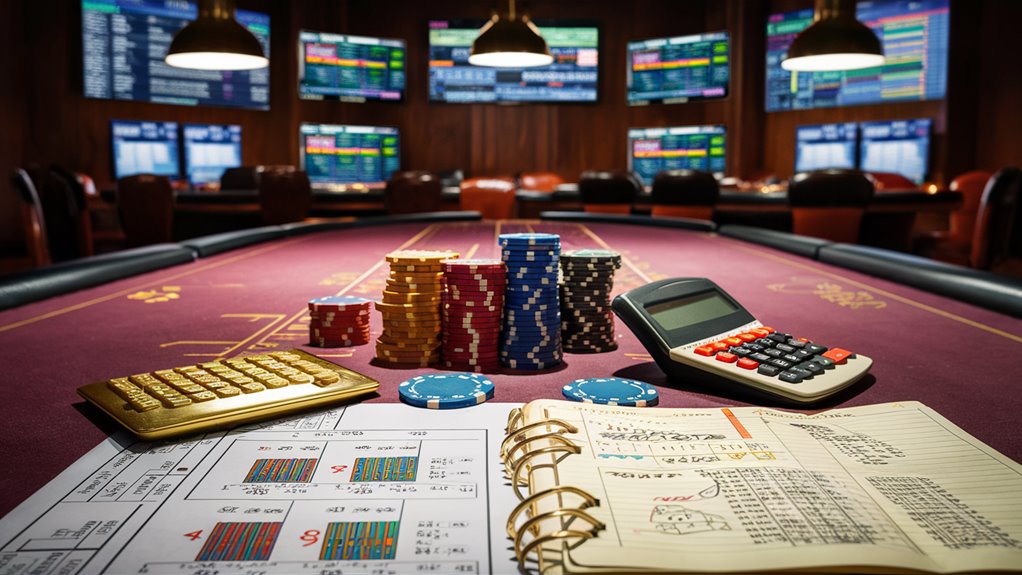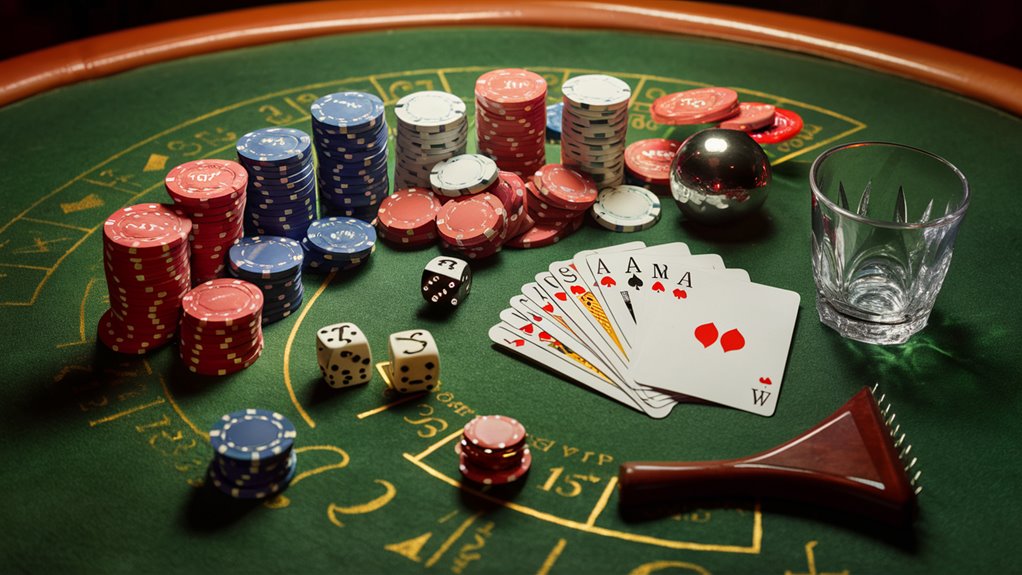How Do Cognitive Biases Affect Your Gambling Decisions?
Key Takeaways
- Cognitive biases significantly impact risk assessment in gambling situations
- Ancient survival instincts can lead to poor decision-making in modern betting
- Understanding these mental shortcuts helps protect against gambling risks
Our brains process gambling risks through cognitive biases and mental shortcuts that evolved for primitive survival scenarios. These psychological mechanisms, while essential for our ancestors’ quick decision-making, often misfire in modern gambling environments.
Common Cognitive Biases in Gambling
- Confirmation Bias: Remembering wins more vividly than losses
- Gambler’s Fallacy: Believing past outcomes influence future results
- Illusion of Control: Overestimating personal influence on random events
- Availability Bias: Making decisions based on easily recalled information
The Evolution-Gambling Disconnect
Our survival-oriented brain patterns create specific challenges in gambling contexts:
- Quick-decision mechanisms override logical analysis
- Pattern-seeking behavior leads to false correlations
- Risk assessment systems calibrated for physical threats misinterpret gambling odds
Protecting Against Cognitive Biases
To make better gambling decisions:
- Acknowledge that these biases exist
- Track all gambling outcomes objectively
- Set strict betting limits before playing
- Use mathematical probability rather than intuition
- Take regular breaks to reset mental patterns
Understanding how cognitive biases influence gambling behavior provides the first step toward making more rational betting decisions and managing gambling risks effectively.
Common Mental Shortcuts in Gambling
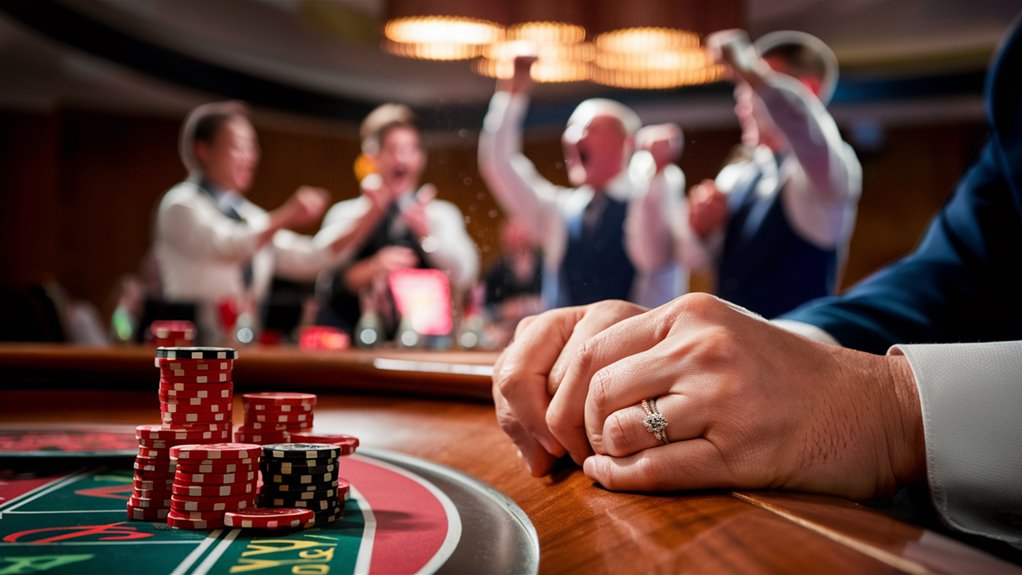
Why Do Gamblers Fall for Common Mental Shortcuts?
Key Takeaways
- Mental shortcuts like the hot hand and gambler’s fallacies lead to irrational betting decisions
- Confirmation bias causes gamblers to remember wins more vividly than losses
- Understanding these cognitive biases is essential for making more rational gambling choices
Common Gambling Mental Shortcuts Explained
Mental shortcuts in gambling can quickly impact your decision-making and bankroll management.
These psychological patterns affect both novice and experienced players, often leading to costly mistakes at the betting table.
The Hot Hand and Gambler’s Fallacies
- Hot Hand Fallacy: Believing a winning streak will continue
- Gambler’s Fallacy: Assuming past outcomes influence future results
- Example: Thinking red must appear on roulette after multiple black outcomes
Confirmation Bias and Memory Distortion
Confirmation bias plays a significant role in gambling behavior by:
- Creating false impressions of winning frequently
- Selective memory of successful bets
- Downplaying or forgetting losses
The Sunk Cost Trap
Players often fall into the sunk cost fallacy through:
- Continuing to bet after significant losses
- Believing they must “win back” previous losses
- Emotional investment in losing positions
Making Better Gambling Decisions
To avoid these mental traps:
- Question your betting rationale
- Focus on mathematical probability
- Track all wins AND losses
- Set strict betting limits
- Take regular breaks to assess decisions
Remember: Each gambling event is independent, and previous outcomes don’t influence future results.
Understanding these cognitive biases helps develop more strategic and rational betting approaches.
The Illusion of Control
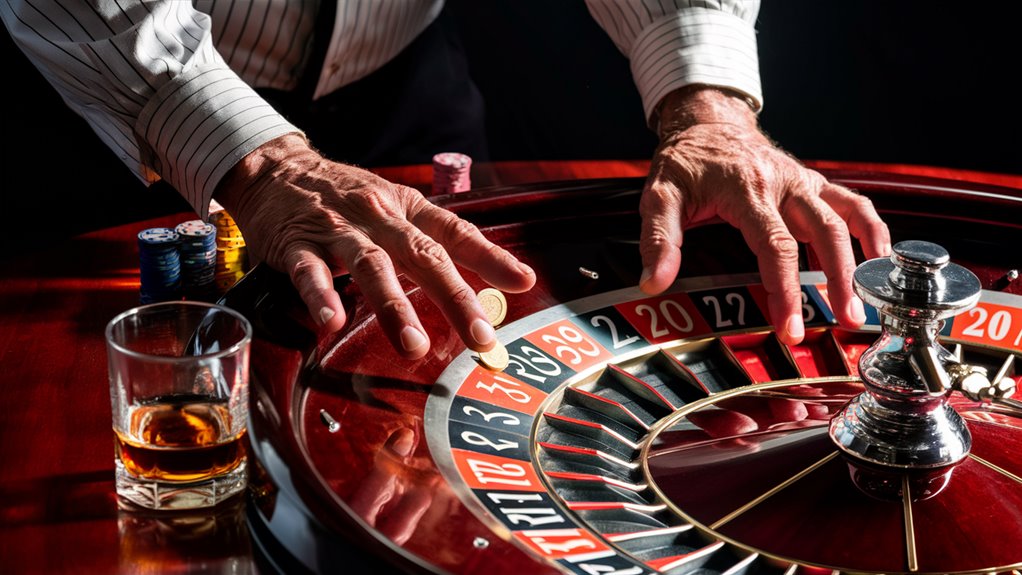
What Makes Gamblers Think They Can Control Random Outcomes?
Key Takeaways
- The illusion of control leads gamblers to believe they can influence random events
- Rituals and patterns have zero effect on mathematically determined casino odds
- Recognizing this psychological trap helps prevent gambling losses
Understanding the Control Illusion in Gambling
The illusion of control in gambling creates a dangerous psychological trap where players mistakenly believe they can influence random outcomes through personal actions.
This false belief manifests when gamblers perform rituals like blowing on dice, choosing specific slot machines, or selecting “lucky” numbers, despite these actions having no mathematical impact on results.
Common Manifestations of Control Illusion
- Believing in “hot” or “cold” machines
- Following betting patterns or systems
- Tracking previous outcomes for predictions
- Performing luck-based rituals
- Choosing specific times or locations to play
Why This Illusion Is Dangerous
The control illusion becomes particularly risky when gamblers convince themselves they’ve mastered game patterns or developed winning strategies.
The “due for a win” mentality or belief in pattern recognition leads to increased betting and potential financial losses.
Mathematical Reality vs. Perceived Control
Casino games operate on fixed mathematical probabilities that always favor the house:
- Slot machines use random number generators
- Roulette odds remain constant regardless of previous spins
- Card game probabilities don’t change based on past hands
Protecting Yourself from the Illusion
- Acknowledge that casino games are purely chance-based
- Remember that no strategy can overcome house advantage
- Recognize when you’re attributing wins to skill rather than luck
- Set strict betting limits before playing
- Accept that patterns in random events are coincidental, not predictive
Chasing Losses and Sunk Costs
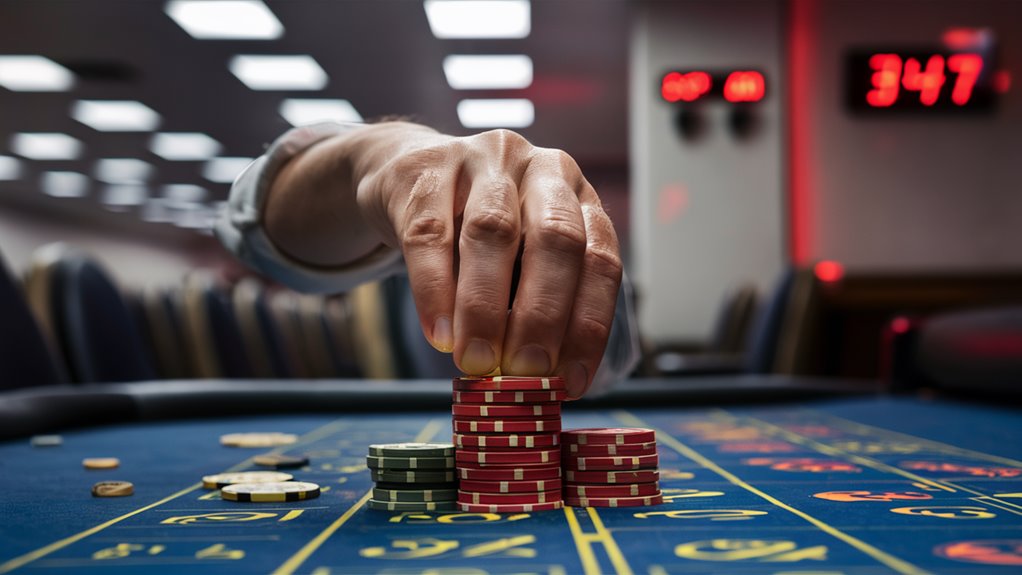
Why Do Gamblers Chase Losses and Fall for Sunk Costs?
Key Takeaways
- Chasing losses leads to increasingly risky betting behavior
- Sunk costs can’t be recovered through additional gambling
- Each betting decision should be evaluated independently
- Emotional pressure intensifies with mounting losses
Understanding the Psychology of Loss Chasing
When you’re on a losing streak, your brain can play tricks on you.
Loss chasing behavior occurs when gamblers increase their bets to recover previous losses, creating a destructive cycle that clouds rational judgment.
Think of it like digging a deeper hole while trying to climb out ??each bet meant to recover losses often leads to an even worse situation.
The Sunk Cost Trap in Gambling
The sunk cost fallacy manifests when gamblers focus on past losses rather than present decisions.
Lost money in gambling is permanent ??it’s already gone and can’t be recovered through more betting.
Yet many players tell themselves, “I’ve lost too much to quit now,” leading them to risk even more money.
Breaking the Cycle
To make better gambling decisions:
- Treat each bet as an independent decision
- 토토사이트
- Set strict loss limits before playing
- Recognize when emotions are driving choices
- Accept that past losses can’t be recovered
Impact of Emotional Decision-Making
Mounting losses create psychological pressure that can impair judgment:
- Increased anxiety leads to riskier bets
- Desperation clouds rational thinking
- Emotional stress makes walking away harder
- Focus shifts from entertainment to recovery
Remember: Every new betting decision should be based on your current situation, not past losses.
Making choices driven by the need to recover losses typically leads to more significant financial damage.
Confirmation Bias During Betting
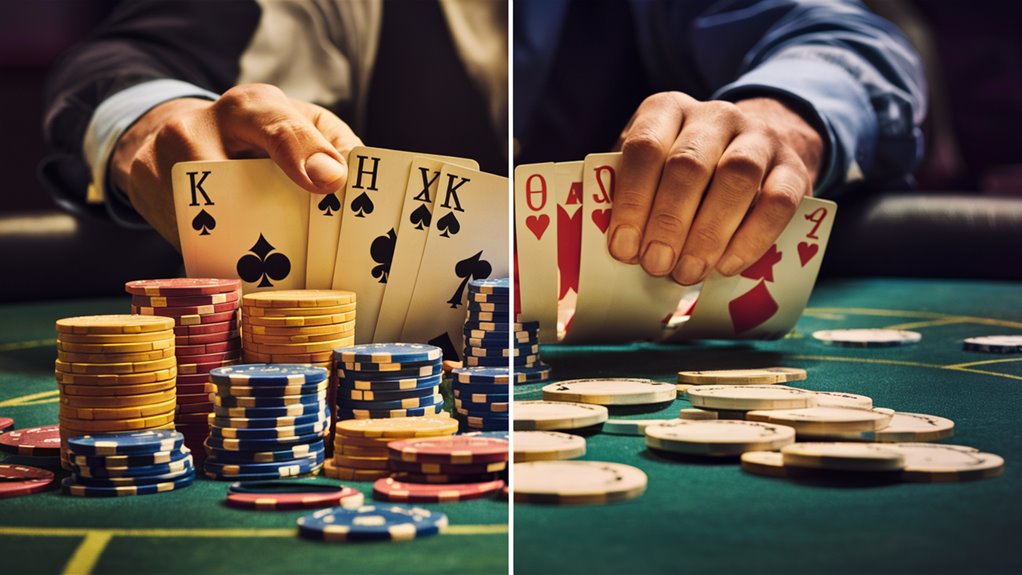
How Does Confirmation Bias Affect Sports Betting Decisions?
Key Takeaways
- Bettors naturally seek information that confirms existing beliefs while ignoring contradictory evidence
- Social media and betting forums can create echo chambers that reinforce biased thinking
- Maintaining detailed betting records and seeking opposing viewpoints helps combat confirmation bias
Understanding Confirmation Bias in Betting
Confirmation bias fundamentally shapes betting behavior by influencing how bettors process and interpret information.
When analyzing sports bets, people naturally gravitate toward statistics and data that support their existing beliefs while dismissing contradictory evidence.
For example, a bettor convinced that a team is “due for a win” typically focuses exclusively on recent strong performances while overlooking significant weaknesses.
Impact on Statistical Interpretation
This cognitive distortion directly affects how bettors interpret betting patterns and statistics:
- Selective memory of successful bets
- Dismissal of losing streaks
- Overemphasis on supporting data
- Minimization of contrary evidence
The Social Media Echo Chamber
Social media platforms and gambling forums can significantly amplify confirmation bias through:
- Formation of like-minded betting groups
- Avoidance of opposing viewpoints
- Reinforcement of existing betting strategies
- Development of overconfidence in betting decisions
Strategies to Combat Confirmation Bias
- Maintain detailed records of all bets, including losses
- Actively seek out opposing viewpoints and analysis
- Review betting history regularly for patterns
- Challenge personal 하이스테이크 포커 assumptions about betting strategies
- Consult diverse sources for betting information
Pattern Recognition Gone Wrong
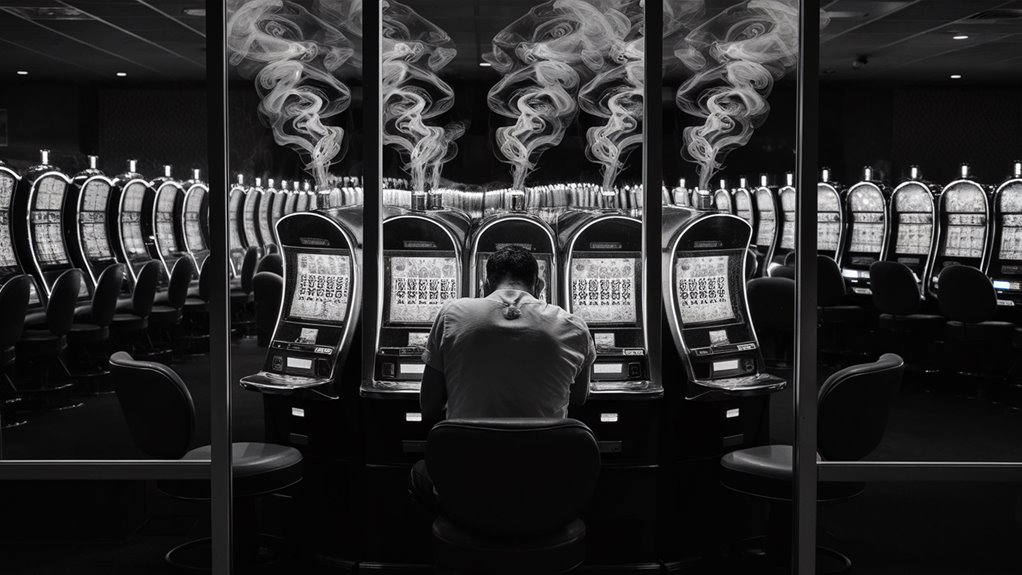
Why Do Gamblers See Patterns Where None Exist?
Key Takeaways
- Pattern recognition in gambling leads to cognitive biases and financial losses
- Each gambling outcome is statistically independent of previous results
- Understanding the gambler’s fallacy helps avoid destructive betting behaviors
Understanding the Pattern Recognition Trap
Pattern recognition in gambling creates one of the most dangerous cognitive traps for players at casinos.
Your brain naturally seeks patterns as a way to understand and navigate the world around you. When applied to games of chance, this instinct can lead to significant losses and irrational betting decisions.
The Science Behind Random Events
Each gambling outcome operates independently of previous results. Consider these examples:
- Roulette: A red outcome five times in a row doesn’t increase the probability of black appearing next
- Slot machines: Previous spins have zero influence on upcoming results
- Card games: Each new hand represents a separate probability event
Real-World Example: The Coin Flip
A simple coin flip demonstrates this concept perfectly.
Even after landing heads ten consecutive times, the probability of getting tails on the next flip remains exactly 50%.
The coin maintains no memory of previous flips, making each toss a completely independent event.
Making Better Betting Decisions
To avoid falling into the pattern recognition trap:
- Accept that each gambling event is independent
- Ignore perceived “hot” or “cold” streaks
- Base decisions on actual probabilities rather than imagined patterns
- Recognize when your brain tries to create connections between random events
Making rational betting choices requires acknowledging and overcoming these natural cognitive biases.
Breaking Free From Gambling Biases
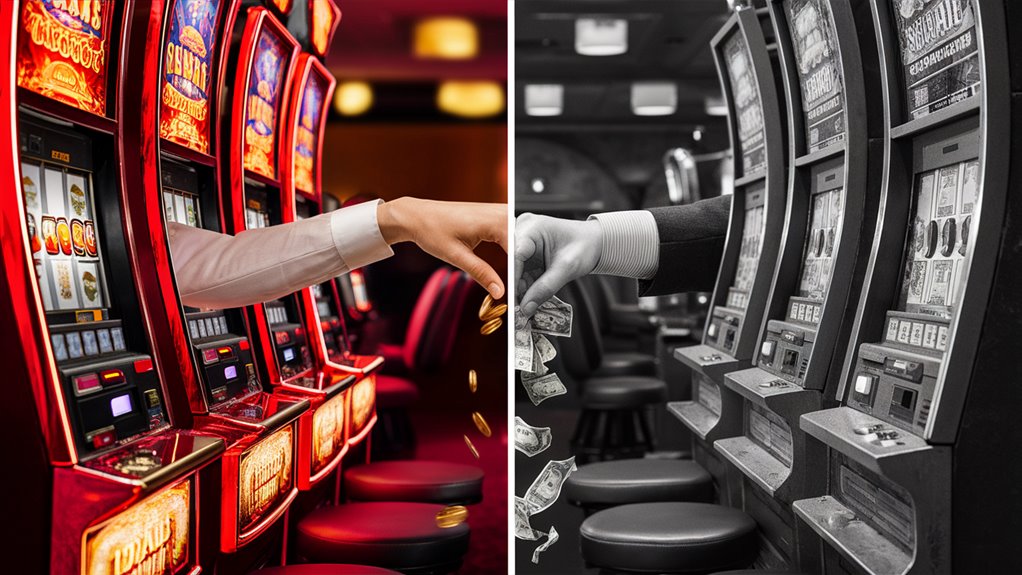
How Can You Break Free From Gambling Biases?
Key Takeaways
- Recognize common gambling fallacies like the “hot hand” and “gambler’s fallacy”
- Use data tracking and probability tools to make informed decisions
- Set strict monetary and time limits before gambling sessions
- Practice self-reflection through journaling to identify cognitive distortions
Understanding Gambling Biases
Breaking free from gambling biases starts with understanding how our brains create false patterns in random events.
These cognitive distortions can lead to irrational betting decisions and loss-chasing behaviors.
Practical Steps to Overcome Biases
- Track Your Decisions
- Keep a detailed gambling journal
- Record thoughts and emotions during sessions
- Review patterns in decision-making
- Use Statistical Tools
- Employ probability calculators
- Compare actual odds versus perceived chances
- Study mathematical concepts like regression to the mean
- Implement Protective Measures
- Set non-negotiable monetary limits
- Use timers during gambling sessions
- Take regular breaks to assess decisions
Breaking Common Fallacies
The independence of gambling events means previous outcomes don’t influence future results.
Each roll, spin, or deal stands alone, regardless of past patterns.
Making Data-Driven Decisions
- Calculate true probabilities before betting
- Compare house edge across different games
- Focus on mathematical facts rather than feelings
- Review historical betting data objectively
Remember: Gambling establishments design their environments to exploit cognitive biases.
Understanding this helps maintain rational decision-making during gaming sessions.






